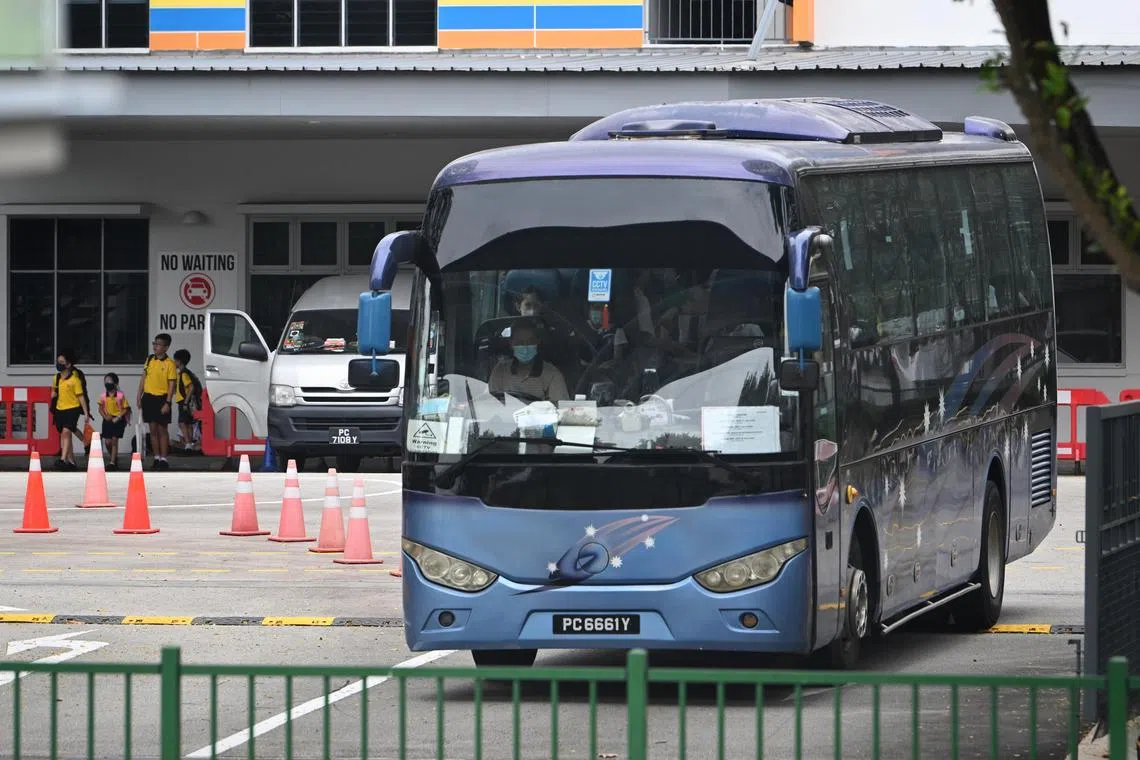MOE announces measures to ease school bus driver crunch, including allowing more foreign drivers
Sign up now: Get ST's newsletters delivered to your inbox

Other measures include letting school buses use common pick-up and drop-off points from 2024.
ST PHOTO: CHONG JUN LIANG
SINGAPORE - Selected school bus operators will be allowed to hire more foreign workers in a move by the authorities to address a persistent driver shortage that has led to firms terminating contracts early.
The Ministry of Education (MOE) on Monday announced this and other measures to tackle the labour crunch,
MOE met school bus associations and operators on Monday, informing them that they can apply for a higher foreign worker quota for school bus drivers.
“We have decided that it is necessary to provide selected bus operators with limited additional foreign worker quotas to augment the supply of bus drivers on a time-limited basis,” MOE said, without elaborating on the duration of the scheme.
The ministry added that it will work with operators to “phase in more workers based on their needs, taking into consideration the extent of their participation in serving our schools, as well as their demonstrated continued efforts to actively recruit local drivers”.
MOE also told The Straits Times that the additional foreign worker quota will apply only to work permit holders, and applications can be made from June. The operators who apply will know if they are successful within a month.
Bus operators must have secured at least two MOE schools to qualify to apply, MOE added.
Singapore School Transport Association spokesman Darry Lim said the majority of its members own fewer than six buses. He noted that operators of such scale are unlikely to hold more than one school contract.
In addition, some operators opt to be sub-contractors to companies that hold the school bus contracts. Such operators would not meet MOE’s two school contracts criteria to apply for the additional foreign worker headcount, Mr Lim noted.
The association represents around 80 per cent of the school transport industry. Under the current scheme, such small operations usually do not have enough local employees to get any allocation of foreign workers.
School bus contracts are awarded through a competitive bidding process using a contract template provided by MOE. This defines the fares that operators are allowed to charge based on how far the addresses are from the school.
MOE also announced that for contracts that start from 2024, operators will be required to serve only pupils living up to 4km from school, down from 6km. An operator can choose to ferry pupils who live farther from school, but the fare would be negotiated separately with the parents and is not bound by the contract.
Operators will also be allowed to designate common pick-up and drop-off points. This is meant to enable drivers to serve more pupils on each school bus route and use larger-capacity buses where appropriate, so operators can deploy fewer drivers.
MOE said reducing the number of stops may also help cut overall journey times and allow pupils who are picked up first to board the bus later.
Industry players said it remains to be seen how feasible it would be to implement the common pick-up and drop-off points, as parents may not be willing to accept the arrangement without protest.
The revised contract template will include an initial contract period of two years, with an option period of another two years. Operators would be allowed to submit a second set of fares during the tender for the additional two years.
MOE said this was to help operators keep their services sustainable.
Currently, operators cannot raise fares without going through a fresh tender process. Typically, the contract lasts for two years with an option to extend for another two years, with prices and terms unchanged.
This move comes as operating costs – especially the price of fuel – have risen significantly in recent years, beyond the levels when the contracts were set. On its part, MOE had allowed operators to ask for a one-time fare hike capped at 7 per cent from January 2023, but sources have said this was not enough to cover the hike in costs.
Mr Phillip Peh, president of the Singapore School & Private Hire Bus Owners’ Association, welcomed the option to include a second set of fares, as it gives operators some leeway to cope with changes in market conditions.
MOE said pupils who use school bus services are the minority, and those who are on its Financial Assistance Scheme – which covers 65 per cent of monthly school bus fares – can continue to approach their schools for help.



